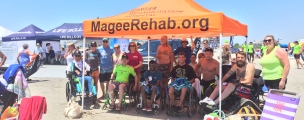Hey Magee blog readers, do you know what month it is?
It’s Aphasia Awareness Month!
Don’t know what aphasia is? Don’t worry – you’re not alone! Even though there are four times as many people diagnosed with aphasia every year than CP and ALS combined, most people have never heard of it. We hope to change that!
So, what is aphasia, you ask… (and we’re so glad you did)…
According to the National Aphasia Association, aphasia is “an acquired communication disorder that impairs a person’s ability to process language, but does not affect intelligence. Aphasia impairs the ability to speak and understand others, and most people with aphasia experience difficulty reading and writing.”
It’s a condition that is way more common than you think! For example, did you know that…
- 80,000 people are diagnosed with aphasia every year*
- 1,000,000 people have aphasia in the United States**
- Up to 2,000,000 people may have aphasia by 2020
- 85% of aphasia cases are the result of stroke
- 25-40% of stroke survivors have aphasia
Magee’s Aphasia Community Support Group is on a mission to get the word out! In honor of Aphasia Awareness Month, the group celebrated at their June 3rd meeting by relishing in their newly acquired Proclamation from Mayor Nutter’s office declaring June as Aphasia Awareness Month in Philadelphia! Special thanks to Dr. Whitney Postman, per diem speech therapy staff member at Magee, for helping to secure the document for the members!
Magee’s Aphasia Community Support Group provides a safe, supportive environment for individuals with aphasia and their love ones to practice communication skills, socialize, learn communication strategies, and support one another. The group meets the first Tuesday of each month (except for August) and is led by Magee Speech-Language Pathologists, Sarah Lantz and Sarah Schmidt. They are proof of the possibility of living fully in the midst of communication disability – and they know how to have fun!
What can you do if you meet someone who has aphasia? Be mindful that strategies may vary from person to person depending on the severity of the aphasia, but here are some simple suggestions:
DO:
- Speak face-to-face
- Use simple language
- Speak at a slightly slower rate than usual
- Repeat key information
- Use gestures
- Give them extra time
DON’T:
- Speak down to them
- Speak for them
- Speak loudly (aphasia does not mean hard-of-hearing!)
DO: Talk to them about their aphasia! It’s probably a big part of their life, and something they work hard at every day. Acknowledging the effort it takes is a great way to connect!
Sources:
*National Aphasia Association
**American Speech-Language-Hearing Association










